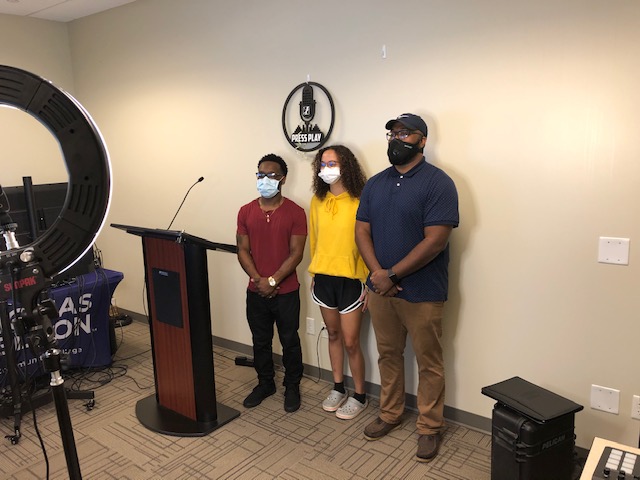College's First Webinar a Success

Will Hawkins (left) and Marcus Williams (right) were the hosts for Thomas Nelson's first webinar, while Student Government Association President Lizz Yimer helped moderate it and provided technical support.
According to one industry report, roughly 850,000 podcasts were available in January 2020. That was an increase of 100,000 from the previous year. As a leader in education on the Peninsula, Thomas Nelson wanted to take advantage of the opportunities podcasts provide, so it opened its "Press Play" podcast center last month with its first webinar taking place last week.
"It went really well," said Lizz Yimer, the Student Government Association president who helped with the show's production and was a moderator. "It went a lot smoother than I thought it was going to."
Fittingly enough, it was on how to get the most out of a podcast or webinar.
Although both are available online, podcasts and webinars differ. Podcasts are pre-recorded audio conversations, similar to a radio interview, and usually don't have video. However, they can be listened to at any time. The listener doesn't need to be in front of a radio at a specific time. Webinars are different in that they usually have audio and visual components, and they happen in real time but also are recorded for viewing at later times. That is what was held Sept. 3 from noon-1 p.m. in Room 719 of the Hampton III Building. Marcus Williams and Will Hawkins from the "Hustle and Motivate" podcast were the hosts.
Williams (a videographer and cinematographer) and Hawkins (a photographer) specialize in wedding events. But they were more than happy to share insights into their foray into their podcasts, which they use mainly to discuss the wedding industry.
They discussed understanding podcasts and webinars; what types of microphones to use; where to hold podcasts (preferably in quiet rooms or places with little background noise), how to deal with background noise; the importance of good sound; how to grow your audience; the best editing programs; tips on how to start or be involved in podcasts; and more.
During the one-hour webinar, the hosts answered questions that were submitted by those watching at home or from other remote locations. One of the questions was in regard to growing their audience.
Williams and Hawkins said it's important to tap into all your connections, and have them reach out to their connections. They said Facebook and Instagram are important tools.
"Having your guests share themselves (on their social media accounts) actually being on the podcast … has been the biggest thing," Hawkins said. "And keeping in touch with people and having people you admire and people who have higher platforms come on helps you spread the message and gets your podcasts out."
Williams' philosophy is simple.
"Do right by people … treat people kind and they'll want to support you," he said. "Your reputation is how you grow it."
Yimer learned more than just some technical aspects of the production. She learned "how important marketing is. We can't just send an email notification out a few minutes before it starts."
Three podcasts, and the one webinar have been produced so far, and Yimer hopes the podcast center is used often.
"I want to get as many people in here as we can," she said. "I think it's a good opportunity for students."
For more information on the podcast center or to reserve the room, go to tncc.edu. For information on Williams, go to intellect-media.com; and for information on Hawkins, go to will-hawkins.com.
